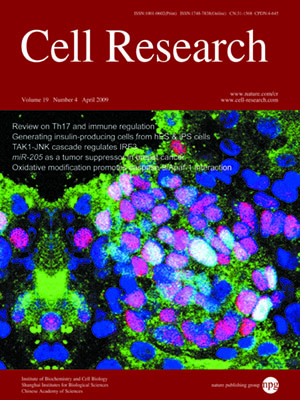
Volume 19, No 4, Apr 2009
ISSN: 1001-0602
EISSN: 1748-7838 2018
impact factor 17.848*
(Clarivate Analytics, 2019)
Volume 19 Issue 4, April 2009: 507-518
ORIGINAL ARTICLES
Low immunogenicity of endothelial derivatives from rat embryonic stem cell-like cells
Juliane Ladhoff1, Michael Bader2, Sabine Brösel1, Elke Effenberger1, Dirk Westermann3, Hans-Dieter Volk1,4 and Martina Seifert1,4
1Institute of Medical Immunology, Charité Universit?tsmedizin Berlin, Campus Charité Mitte, Monbijoustrasse 2a, 10117 Berlin, Germany
2Max-Delbrück-Center for Molecular Medicine, 13092 Berlin, Germany
3Department of Cardiology and Pneumology, Charité Universit?tsmedizin Berlin, Campus Benjamin Franklin Hospital, 12200 Berlin, Germany
4Berlin-Brandenburg Center for Regenerative Therapies (BCRT), Charité Universit?tsmedizin Berlin, Campus Virchowklinikum, 13353 Berlin, Germany
Correspondence: Martina Seifert,(martina.seifert@charite.de )
Embryonic stem cells (ESC) are suggested to be immune-privileged, but they carry the risk of uncontrolled expansion and malignancy. Upon differentiation they lose their tumor-forming capacity, but they become immunogenic by the expression of a normal set of MHC molecules. This immunogenicity might trigger rejection after application in regenerative therapies. In this study MHC expression of and immune responses to endothelial derivatives of rat embryonic stem cell-like cells (RESC) under inflammatory conditions were determined in comparison to primary rat aortic endothelial cells (ECs). Cellular as well as humoral allo-recognition was analyzed
in vitro. In addition, immune reactions
in vivo were assessed by allo-antibody production and determination of interferon-γ (IFNγ)-secreting allo-reactive T cells. RESC derivatives expressed low but significant levels of MHC class I, and no MHC class II. In response to IFNγ MHC class I expression was enhanced, while class II transactivator induction failed completely in these cells; MHC class II expression remained consistently absent. Functionally, the RESC derivatives showed a reduced allo-stimulatory capacity, protection against humoral allo-recognition
in vitro and a slightly diminished susceptibility to cytotoxic T cell lysis. Furthermore,
in vivo experiments demonstrated that these cells do not trigger host immune reactions, characterized by no allo-antibody production and no induction of allo-reactive memory T cells. Our results show that endothelial derivatives of RESC have a distinctive reduced immunogenic potency even under inflammatory conditions.
Cell Research (2009) 19:507-518. doi: 10.1038/cr.2009.21; published online 24 February 2009
FULL TEXT | PDF
Browse 1900


